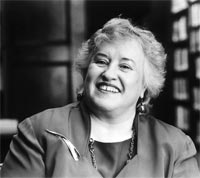
Beverly Musgrave, Ph.D., came close to death and that experience spurred her to create an organization that helps people with serious illnesses.
Photo by Peter Freed
In 1990, one month before Beverly Musgrave, Ph.D., was to complete an oral defense of her doctoral dissertation, she was diagnosed with ventricular tachycardia, an irregular heartbeat that can lead to sudden death. Her doctors told her that she might not survive her night in the hospital.
Musgrave made it through that night, but her recovery turned out to be much more than life saving—it was life changing.
“When you are faced with a life-threatening illness,” said Musgrave, an assistant professor of pastoral care and counseling in the Graduate School of Religion and Religious Education (GRE), “it puts into question your very existence, and you ask yourself what is the meaning of your life.”
The answer to that question for Musgrave was to dedicate herself to training others in the same coping strategies that helped her regain her health. In 1994, she founded Partners in Healing, an interfaith group comprised of clergy and lay people who provide training in coping skills and spiritual support for the sick and their caregivers.
Over the past 13 years, Partners in Healing has maintained close ties to Fordham University. The organization recently partnered with GRE and other groups to put on a conference, “Loss, Illness and Death in Dialogue with Theology and Psychology,” at the Rose Hill campus. It was Partners in Healing’s sixth conference at Fordham focused on the spiritual, physical and psychological aspects of dealing with a serious illness.
“My spiritual life was central to my getting better,” Musgrave said. “Many researchers are looking into the correlation between spirituality and illness, and people with a strong spiritual belief find that it [becomes]a support system. Many people may not know that these coping styles can help.”
The coping strategies at the heart of Partners in Healing involve such things as prayer, finding meaning in the experience of loss and adopting a perspective that accepts loss, illness and death with both hope and courage.
Musgrave and her staff have taught these strategies and other skills to hundreds of volunteers through workshops at parishes around the tri-state area. The workshops are designed to train volunteers in assisting people with life-threatening illnesses. One presentation, for instance, is simply called “Presence” and focuses on teaching caregivers how to help patients feel God’s presence and care. Another workshop trains caregivers how to listen to a person who is ill without giving advice. “It’s very hard to listen to someone who is sick,” Musgrave said, “and not try to fix what is wrong.”
The need for holistic caregivers, she said, is increasing as the population ages. The number of elderly people seeking spiritual support is also on the increase. In 2003, a Newsweek analysis found that more than half of the nation’s medical schools are now offering courses on the religious needs of patients because more of them are demanding spiritual care components to medical treatment.
“Many people in the New York area don’t have family to rally to their support when they are ill,” Musgrave said. “And we can’t expect that clergy will be available to attend to the sick. Partners in Healing trains lay leaders to assist the clergy and fulfill the baptismal calling to holiness, generosity and service to others.”
Musgrave’s experiences with her own illness and with Partners in Healing led her to co-edit Partners in Healing: Bringing Compassion to People With Illness or Loss (Paulist Press, 2003), which offers ways in which religious congregations can get involved in serving the health needs of the sick in their communities.
For Musgrave, religious faith played a major role in her recovery, as did the support of friends and family. Nearly 20 years later, she is convinced that the mind and spirit are as important in the healing process as is the physical body.
“All of this,” she said, “is our way of trying to create healing communities in the whole metropolitan area.”
